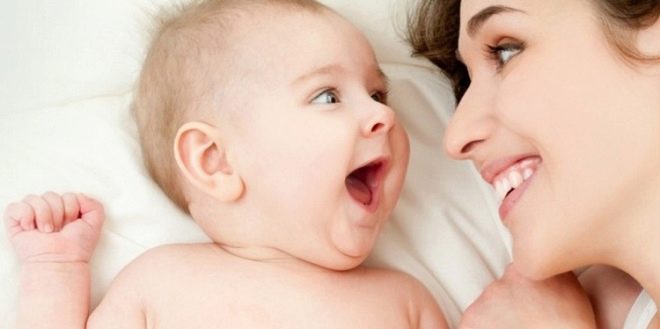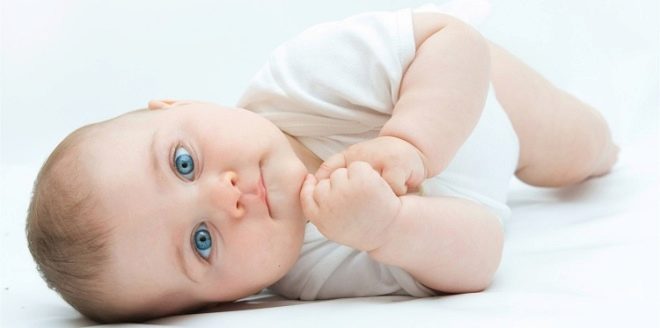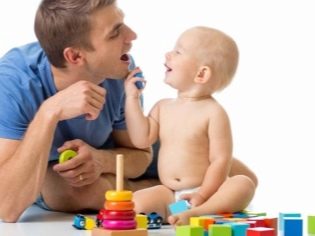When does a child begin to smile consciously?
Every mom and dad would like to see the smile of their baby addressed to him. But the time of conscious smiles is yet to come, and this happens not immediately after discharge from the hospital. In this article we will talk about when the little mummy begins to smile consciously and how to understand that this time has come.
Special features
Just born man smiles. But he does it unconsciously. Such involuntary smiles are associated with the rapid formation and "debugging" of the nervous system, which began in the period of prenatal development and continues during the first years of a child's life. A fleeting unconscious smile appears on the face of a newborn at any time when his body is sufficiently relaxed - in a dream, during water procedures, after feeding. This first physiological smile is not addressed to anyone - neither mom, nor dad, nor even grandmother, no matter how much the last one wants.
Mom or another adult who cares for the baby, communicating with him can smile, the baby can begin only after a number of important conditions are fulfilled in his body:
- facial muscles are ready and "ripe";
- psycho-emotional sphere of the child is successfully developing;
- the nervous system is ready to activate the mimic muscles of the child;
- hearing becomes more acute;
- Vision develops and the baby can already see the face, focus on it, there is face recognition.
A newborn does not possess all these skills. He has another, louder tool for communication - the cry. With a cry he shows that he is hungry, that he is wet or in pain. It cannot be said that the newborn is devoid of emotionality, it is not. But it is different in nature and is aimed at providing the first and most natural needs - nutrition, safety, survival.
Emotional conscious smile appears usually at the age of 2-3 months. The child can not only widely and toothlessly smile at his dad or mom in response to the affectionate appeal of entering the children's room, but also demonstrates a vivid sign of emotional maturity - a revitalization complex. He animatedly waving his arms and legs, trying to bend the back.
Most often, the ability to smile with your loved ones appears at about the same time as the ability to shout and fuck. Together, these skills produce the effect of stunning happiness on parents. Contact becomes not one-sided, as in the first weeks of a child's life, but quite mutual.
Why does the baby not express joyful emotions?
If a child does not smile, it is not at all necessary that he has health problems. Quite often, the reason is the elementary absence of a clear example. If it is not customary in the family to express emotions brightly, the household is extremely serious and focused and restrained, then the baby will copy just such a pattern of behavior.
Children with whom they speak little, who do not see smiles from their mother, and they see mother only during the next feeding, usually lag far behind their peers in psycho-emotional development. They simply have nowhere to take examples of emotions.
It is necessary to take into account the child’s own character. He was born with him and that is how (with minor adjustments in detail) the character will remain. If, from birth, the baby is a “beech” or a focused observer, then it will not be easy to make him have a conscious smile.
Other reasons for the lack of a baby smile are as follows.
- The baby was born prematurely. These children need more time not only for physical but also for emotional development.
- Pregnancy proceeded hard. Any negative effects on the fetus during gestation can slow its development after birth. The main factors are rhesus-conflict between mother and fetus, intrauterine chronic hypoxia.
- Heavy labor. Birth injuries, cerebral haemorrhage, ischemia, and acute hypoxia are dangerous.
- Neurological diseases, mental disorders, autism, dementia.
Meaning of smiles
After the additional ability to smile is added to the baby’s usual cry, he will use smiles to express a variety of different emotions. Of course, first of all, to demonstrate the joy of the kind of loved one. Also, a baby starts expressing pleasure from 2.5-3 months old. A well-fed, dry, healthy child can contemplate a mobile above the crib or the ceiling for quite a while and smile blissfully.
After six months, many kids begin to send smiles not only to their mother and favorite toys, but also to strangers who turn to them - the pediatrician at a clinic, a massage therapist, and a neighbor on the landing.
Do not think that inappropriate smiles are necessarily a sign of mental disorder. What seems serious to adults can be quite funny for an infant, and to that he will smile. Mental illness in the first year is usually not diagnosed at all.
How to stimulate the skill?
The kid will surely learn to smile and will do it with undisguised pleasure, if from the first days of his life he will be surrounded by the attention and love of adult family members. The more often he sees smiles around, the faster he will master this amazing skill. Babies imitate a lot, and their own parents are the best teacher. In addition, a smile is a sign of good nature and safety, and newborns are able to feel it intuitively.
The more sincere the parental smile will be, the sooner the child will understand that this facial expression is very good, and will try to repeat it. Smile development is promoted by massage of the palms and fingers of the baby, daily fortifying massage, fun exercises, which will not only be a gym for developing muscles, but also training for the child's emotion.
For this reason, it is recommended to always accompany the massage with songs and rhymes, funny jokes, and counting. The child of the first months of life does not perceive the words of an adult, he does not care what it says - children's poems or the multiplication table, the main thing is tone, intonation, and emotional color of speech.
Opinion of Dr. Komarovsky
A well-known and popular among mothers is a children's doctor and TV presenter Yevgeny Komarovsky asserts that the kid just needs time and parental participation. It is these two factors that determine the psycho-emotional development of the toddler.
If the mother has only complaints about the lack of a conscious smile, and in all other respects the child is healthy and develops according to age, eats well, sleeps, walks with pleasure, is interested in surrounding objects, toys, then parents have no reason to worry, Komarovsky believes. But the lack of a smile combined with the lack of attempts to lift the head in the prone position, lack of eye contact (the child does not look at the mother), pale skin, weakness, poor appetite, frequent regurgitation, neurological symptoms - a reason to show the child to the doctor to the neurologist.
About when the baby begins to smile consciously, see the next video.




















